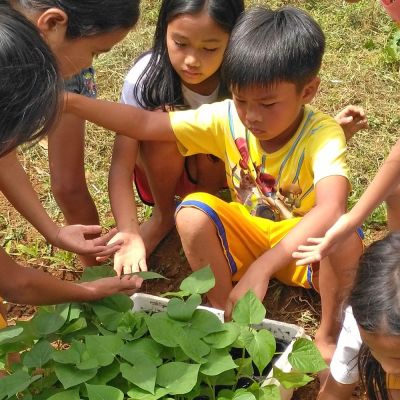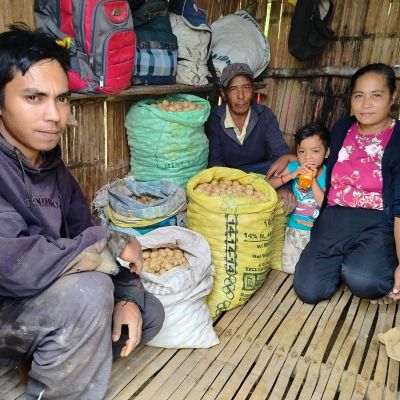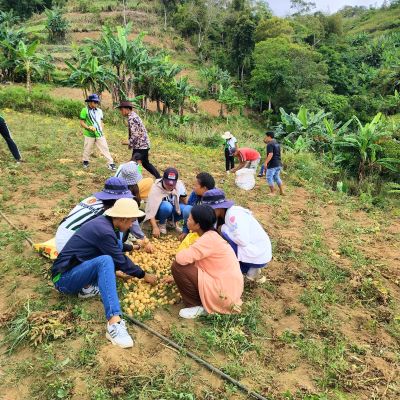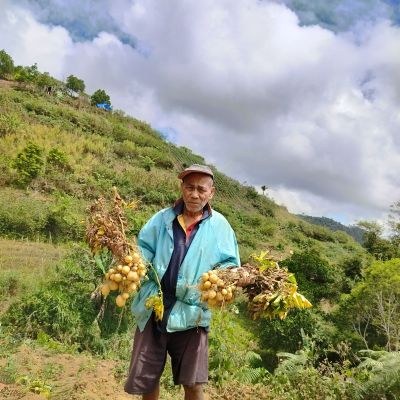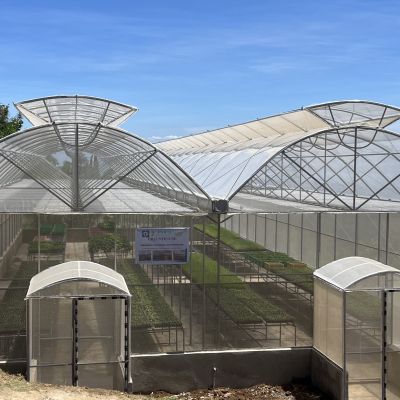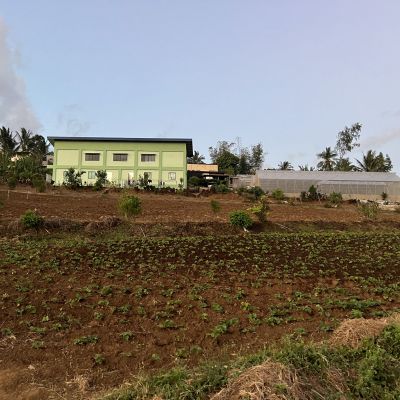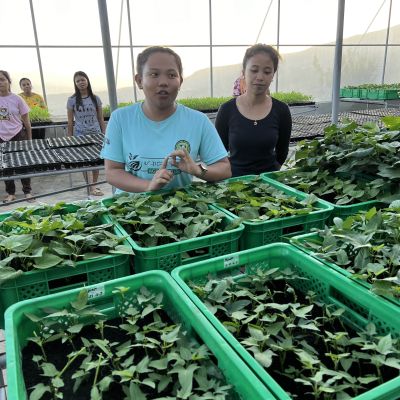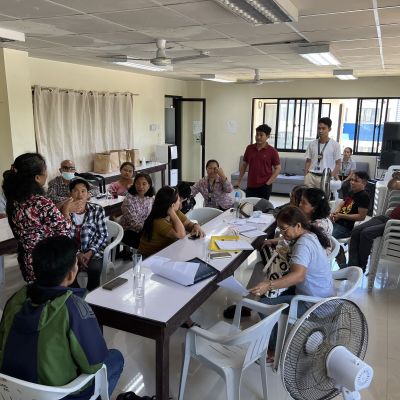Philippines
Sunrise Potato Systems Institute is dedicated to empowering families in remote mountain farm communities in the Philippines.
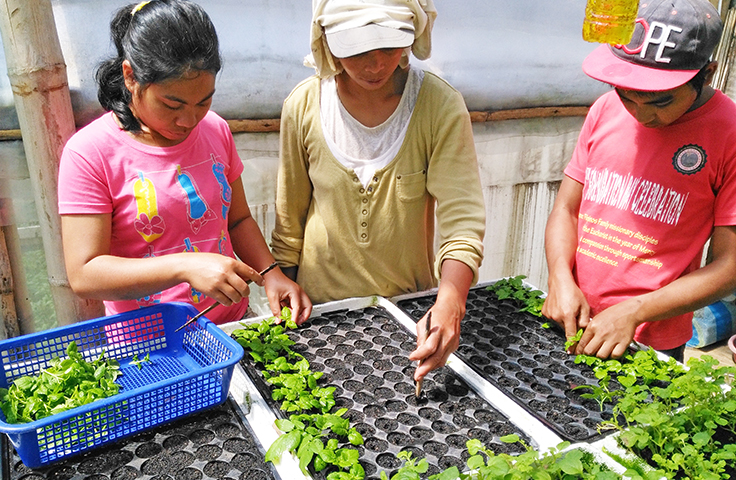
About Our Program
Imagine lacking the basic necessities of family life and no credit or technical support for farming. Empowering such families in remote mountain farm communities with quality planting material of various crops and improved technological inputs with financial credit and marketing support. See the strategy implemented and results!
Our Partnerships
Potato Systems Research & Training Center (PSRTC) is our partner organization. A four member team is leading this work in the townships surrounding Mount Kanlaon. Dr Victoria Demonteverde is the President of the center as well as our Country Director. She is both a Professor of Rural Development and Horticulture. Her support staff include her husband Regie, daughter Vickie Joy as well as a number of staff with various specialties.
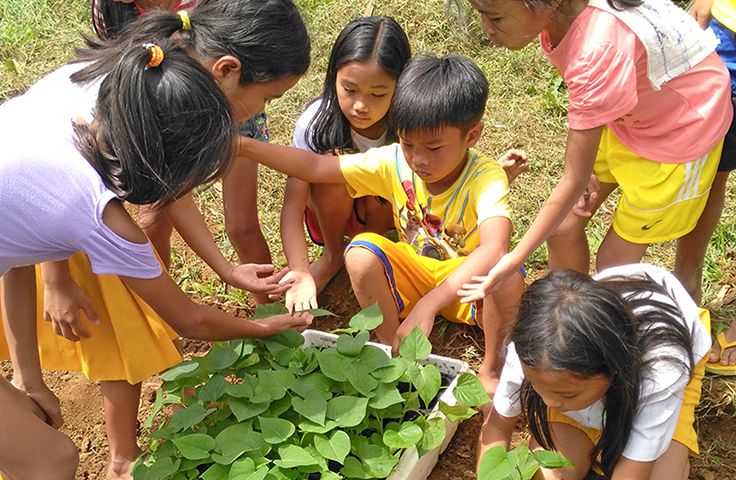
Gallery
See our Philippines program in action!
Newsletters
Get the latest on our programs!
Chronicles of Transformation - 2024
Chronicles of Transformation - 2023
Chronicles of Transformation - 2022
Chronicles of Transformation - 2021
Chronicles of Transformation - 2020
Chronicles of Transformation - 2019
Chronicles of Transformation - 2018
Mount Kanlaon, Negros Philippines
Background
Having been in the Philippines as Regional Director of CIP, Peter had personal experience on how the implementation of Land Reform program had changed the scenario of agricultural landscape. The land reform law enacted on September 26, 1972 and the Comprehensive Agrarian Reform Law that become effective on June 15, 1988 had led to the conversion of large tract of land or “haciendas” into small land holdings owned by former tenants or farm workers. Farm owners were only allowed a retention of five hectares for parents and a maximum of three hectares each for the children. The program was enforced for sugarcane and rice farms. On Negros Island, where sugarcane primarily grown, the new resource poor first time farm either continued to plant sugarcane or shifted to other crops.
In Canlaon City, many farmers shifted to potatoes and vegetables. The areas surrounding Mount Kanlaon became part of the protected areas under the NIPAS Law or National integrated Protected Areas Systems. However, human encroachment was unabated as people moved to higher elevation, clear the lands and plant vegetables including potatoes. Meanwhile fruit trees including apples were being planted in the lower elevation areas. In 1985, Dr. Ramon Valmayor, one of the hacienderos, then the Director General of Philippine Council for Agricultural Research and Development requested that Peter go there to see the opportunities for apples and potatoes in Canlaon City.
The initial visit to Mt Kanlaon was by hiring and riding in the back of a 6 wheel drive army truck over the almost impassable trails up the mountain. Bianito “Choi” Susanna, researcher for Peter at CIP (International Potato Center) in Philippines, joined on this exploration. The reception by the farmers was warm and they were eager to receive support for growing potatoes. Choi agreed to spend blocks of time in the area living at the home of the Velarde’s, a community farm leader. Through CIP, true potato seed of adapted heat tolerant and bacterial wilt resistance germplasm was introduced by Choi. Peter made several trips to the area annually. By the end of 1990, the collaboration stopped.
Vickie Demonteverde became Peter’s first MSc graduate student at the University of the Philippines in 1984. After completing her degree, Peter hired Vickie as the station manager of the Regional Germplasm and Training Center on Mt. Banahaw, Quezon. Here she managed the training of people from all over Asia who came to learn about tissue culture and rapid multiplication techniques for growing virus and disease free minitubers of potatoes as well as other technologies including potato breeding and selection for growing potatoes from True (Botanical rather than tuber) Seed.
After her 10 year career with CIP, Vickie moved back to Negros to become a researcher, community extension leadership and Instructor at West Negros University in Bacolod. While there, she requested Peter’s assistance in doing her Doctorate. This was arranged with Pangansinan State University and that she could study the impact of Rapid Multiplication of potatoes, using the techniques that she once taught, by the potato farming communities of Benguet and Mountain provinces of the Philippines and compare that with the work being done by farmers in Dalat Vietnam. This turned into a very interesting and impactful research project which was more focused on the social sciences rather than biological science.
Vickie and her husband, Regie were then ready to again work with Peter on helping poor farmers and being Negrenses (citizens of Negros), the conversation lead us back to the opportunities on Mt Kanlaon, where we had not been for 20 years. Together we visited the areas where Peter once travelled on the mountain and heard stories about the “Americano”who came there with Choi to provide potato seed. Surprisingly, most of our collaborators from the 1980s were deceased already. To our great surprise, the potato varieties that the farmers were growing, were all selections coming from the True seed that we brought there in 1985! And several of them were named after Choi. Details of that story were published in a paper in the American Journal of Potato Research titled: Exceptional Potato Clones Selected by Filipino Farmers from True Potato Seed: Status after 30 years (article is under news).
In 2014, we were able to purchase 2 adjoining parcels of land of five and three hectares in Barangay Pula. These were the remnants of a Hacienda. We were able to buy them from the original owners. These properties were on title and are at the edge of the Kanlaon National Park. In the Park, all the land is occupied by people without land title. Vickie and Regie along with their three children are the owners of this property and along with Peter and Carla started to revitalize the land which had been destroyed by many years of tenant abuse. After three years of getting established on the land the plan to start Community Empowerment work was born.
Potato Systems Research & Training Centre Inc. (PSRTC)
The Potato Systems Research and Training Center (PSRTC) was established in 2016 on the Canlaon Potatoes & Flowers (CPF) farm, owned by the Demonteverde family. The facility includes two offices, two dorm rooms, a tissue culture laboratory, kitchen and bathroom facilities, lecture hall and large utility building for storing agricultural products and equipment. Adjacent are series of screen houses for the multiplication of planting materials for all the crops demanded by the farmers.
In November 2018, PSRTC was officially registered as a non profit corporation under Philippine law with a Board of Trustees and officers. PSRTC is the official partner of SPSI. Dr Vickie Demonteverde is the President of PSRTC as well as the Director of all the work being done by SPSI through PSRTC. The PSRTC has additional staff members who serve along side Vickie to carry out the its program. The Center implements Thematic Program namely:
Theme 1. Multiplication of Planting materials as a sustainable business that serves farming communities. The focus is on the provision of high quality planting material of selected varieties that are requested by farmers. Potato and Sweet Potatoes have been the major focus but also cabbage, broccoli and other vegetables are being provided. An array of different flowers are now also being evaluated.
Theme 2. Refine and bring to scale proven products and technologies that are demanded and needed by consumers and farming communities. Focus is pilot testing of sweet potato based food products and other agri based products. Conservation agriculture with mechanization will be intensified and introduced to farmers.
Theme 3. Community empowerment through training and introduction of new technology. The National Training Center was officially inaugurated in March 2024. Here education, training, , seminars and workshops are held for various groups interested in general or specific topics related to community empowerment. Large groups of senior University students spent several months learning the practical as well as the theoretical aspects of modern sustainable agriculture. Farmers are also trained through different government programs at the center. Agribusiness venture are also being explored with entrepreneurs including utilization of of sweet potatoes into values added products. .
On the island of Guimaras as well as in an area of Negros, we support improved agricultural practices with financing of loans to permit the communities. On Guimaras, we work with the Four Square Gospel church and Guimaras State University to support 10 communities with improved agricultural practices.
